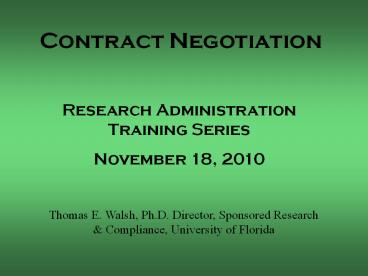Contract Negotiation PowerPoint PPT Presentation
Title: Contract Negotiation
1
Contract Negotiation
Research Administration Training Series November
18, 2010
Thomas E. Walsh, Ph.D. Director, Sponsored
Research Compliance, University of Florida
2
Contract Process
3
TYPES OF CONTRACTS
Research Agreements Federal Contracts Confidential
ity Material Transfer Agreements Non-compete
Agreements
Teaming Agreements Licensing and other IP
Agreements Clinical Trials Purchase
Orders Subcontracts
4
Standard Opening Paragraphs
Two Whereas and one Now, Therefore
- Provides background and rationale.
- Identifies parties.
- Identifies consideration.
- Prefer two party agreements.
5
The contract should be between the
institution and the sponsor. PI should not
sign on behalf of the institution. The
institutional official should sign and bind and
warrant that they have such authority
6
The I Word
UF CANNOT indemnify the other party Beware
of hidden indemnification language such as
patent infringement. Indemnification language
may appear in different sections of a
contract. Hold harmless language is similar to
indemnification language.
7
Alternative Declare Responsibility
Offer boiler plate language that allows you
to assume liability for your own acts and
omissions. Use state self-insurance language
whenever possible or language that limits
insurance to the extent your institution has
coverage.
8
Whose Law Applies ?
Follow the laws of Florida or be silent Do
not accept other jurisdiction or venue.
Jurisdiction Venue
9
LOCATION, LOCATION, LOCATION
Jurisdiction means in what location (county,
state, country) will the contract be subject to
law. A court system may have jurisdiction (power)
to take a case in a wide geographical area, but
proper venue for the case may be one place within
the area. Venue means in what location will
disputes or other legal matters be resolved. It
is the local area where a case may be tried.
10
Injunctive Relief
Admission that breech causes irreparable
harm. Granting injunctive relief means you
agree to immediate injunction against you.
11
CONFLICTS, DISPUTES AND TERMINATION
Termination for convenience (at will). Breech
of contract. Notification of breech Time to
cure default Notice of termination.
12
CONFLICTS, DISPUTES AND TERMINATION
Consider alternative dispute resolution
Avoiding binding arbitration Keep all other
remedies under law available to either party
13
Intellectual Property
Pre-existing and future IP. Background IP
Foreground IP Confidentiality clauses.
14
Intellectual Property
- What is an option?
- Licenses (Exclusive/ Non-exclusive).
- Material Transfer Agreements.
- Intellectual Property Checklist.
15
Publications
- Protect academic freedom.
- Sponsors right to review, not approve.
- Limited to
- Patentable Material
- Proprietary Information
16
Use of names
Do not use the other parts name without prior
approval of the other party. Right to access
information Legal or regulatory needs
17
Acts of God and Nature
Force Majeure
18
SPECIAL CONSIDERATIONS
Are there Federal flow down terms and conditions
? FAR Clauses Debarment, Lobbying, Audit
for A133 Subcontracting restrictions Are
there required State terms and conditions ?
Payment conditional upon availability of funds
Timeliness for payment Travel reimbursement
regulations Limitations on insurance and
indemnification
19
Tough Negotiator

